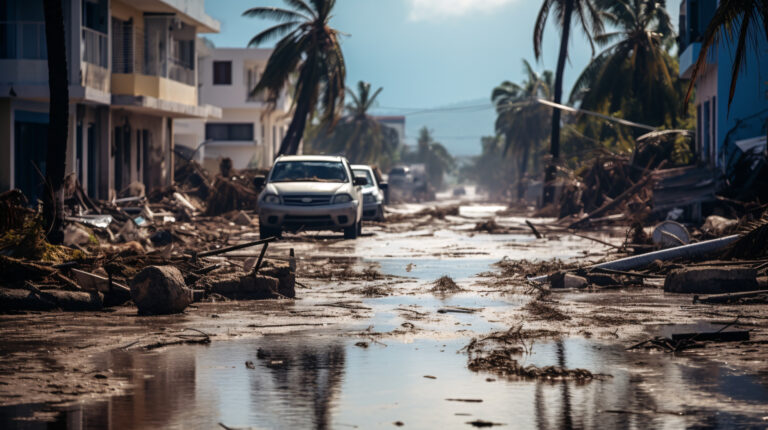Unrelenting wildfires in Canada and Hawaii. Catastrophic floods in Libya. Sweltering temperatures across the globe. These climate disasters, which once would have happened every decade or longer, all took place in 2023. As the planet warms, extreme weather events like heat waves, hurricanes, droughts and floods are undeniably becoming more frequent and intense, according to Pedro DiNezio, an associate professor in the Department of Atmospheric and Oceanic Sciences at the University of Colorado Boulder (CU Boulder).
On the eve of the United Nations Climate Change Conference (COP 28), set to kick off in Dubai on November 30, 2023, DiNezio spoke with Yvaine Ye, a science writer at CU Boulder, about weather extremes becoming the new normal and what can be done to mitigate future climate disasters.
Were there a lot of extreme weather events that happened in 2023?
Oh, gosh. There were so many, and many have been predicted for decades by scientists. I think the most important one, which has been predicted for years, is heat waves during the past summer. Summer used to be a season that we would all wait for excitedly. But summers are now hellish, especially in the northern hemisphere. This past summer, we had so many heat waves here in North America, as well as in Europe and Asia. We also have had really warm temperatures in the southern hemisphere since June. It was their winter, but the temperatures in countries like Brazil reached 100°F [37.7°C].
Then we had Hurricane Danielle in the Mediterranean, which flooded Libya and overwhelmed dams. What this shows us is that an extreme event that goes above what’s normal can destroy our infrastructure in extremely destructive ways. We saw that in Libya but also in New York City a few months ago, when heavy rainfall drenched the city.
Why are we seeing more extreme weather events? What role does climate change play?
Heat waves are normal phenomena in the climate system. But if the climate is already warm, then an event that would happen once every 50 years in the past is happening once every five years because of that extra warmth. That’s why climate change is making heat waves more frequent and intense.
Also, as the climate warms, Earth’s atmosphere can hold more water vapor. When storms happen, all that water vapor will become rainfall, leading to higher rain rates and longer storms.
In terms of wildfires, the atmosphere gets thirsty as it warms up due to well-known physics. The atmosphere quenches this thirst by extracting water from soil and plants. As they dry up, they are easier to catch on fire.
Scientists have said 2023 is on track to be the hottest year on record. According to the National Oceanic and Atmospheric Administration, the 10 warmest years in the historical record have all occurred since 2010. Are we expecting another hottest year next year?
Now we are in the middle of an El Niño event, which is a warming of the ocean surface as a part of the natural climate fluctuations. When global warming and El Niño conspire, which is what happened this summer, we can have these extremely high temperatures.
Next summer, we are anticipating a La Niña event, where the ocean surface cools. It will reverse some of these warming effects. Obviously, it will not reverse global warming, but next year’s heat waves would be less intense than this year’s.
What else are we expecting next year?
El Niño will continue through next spring in the northern hemisphere. For regions like Southeast Asia, we should expect massive heat waves before the onset of the monsoon rains in spring.
In addition, as we enter La Niña next summer, we may see droughts in some areas. Combined with global warming, these droughts could be very intense. In places like the southeastern US and South America, where I’m from, there has been a prolonged drought over the last 20 or 30 years. Every La Niña event exacerbates droughts.
In East Africa, particularly in countries like Ethiopia and Somalia, which have been ravaged by war and famine, we are seeing extreme rainfall this year. Next year, the weather will swing back to drought.
The good news is we can actually predict these events quite well. That gives us a lot of opportunities to prepare for these disasters, mitigate some of the disruptions and sufferings. But more importantly, we can take advantage of these inevitable natural swings to build resilience and international cooperation to adapt to climate change.
Have the recent, extreme weather events influenced the public’s perception of climate change?
It’s been a challenging time climate-wise. We’ve been experiencing a rollercoaster of La Niña, El Niño and La Niña. Earlier last year, we were just coming out of a La Niña, and then we went right into an El Niño. These swings in climate patterns are putting tremendous stress on our society.
In some way, we no longer have to try really hard to convince people that the climate is changing, which was what I had to do when I started my PhD less than two decades ago. Now everyone can see it. Everyone experiences it.
Are you hopeful?
I am a very optimistic person. Industrialization has produced immense progress, but this is an opportunity to rethink how we relate to nature and learn that we depend on nature to maintain our society and civilization. We’re entering a new phase in the climate crisis where we need to communicate more about the tools we have to address it. We need to tell people, particularly the younger generations, that the future will be better because we are improving our relationship with nature and we are developing better technologies to produce the energy we need.
Scientists have been predicting climate change is going to happen for decades. Now is the time to act, and we should act in a way that is just, fair, inclusive and includes everyone on this planet.



